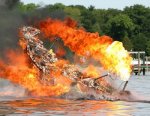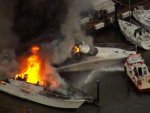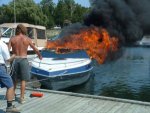iboats.com
Recruit
- Joined
- Apr 5, 2011
- Messages
- 4
[FONT=Trebuchet MS, Lucida Grande, Arial, sans-serif] [/FONT]
[/FONT]
[FONT=Trebuchet MS, Lucida Grande, Arial, sans-serif]You'd think that a boat, surrounded and floating on water, would not necessarily be prone to fire. Furthermore, you'd think that a boat, once on fire, would be easy to put out with more than enough water readily available. However, if you've ever see a boat aflame or even worse had your own boat catch fire, you know fires aboard can easily happen and are very difficult to extinguish. One problem with a fire aboard a boat is that unlike a house where running across the street to escape the flames is an option, on a boat there's no place to go but overboard. Unfortunately, this violates the second rule of boating: Stay with the boat. Ironically, if enough of what the boat is floating on can be brought into the boat, the fire can usually be put out. This, however, violates the first law of boating: Keep the water outside the boat. [/FONT]
[FONT=Trebuchet MS, Lucida Grande, Arial, sans-serif]Of course, preventing fires from starting to begin with is the best defense. By learning the top reasons why fires start can help you become aware of these factors on your own boat. [/FONT]
[FONT=Trebuchet MS, Lucida Grande, Arial, sans-serif]1. AC and DC wiring/appliance [/FONT]
[FONT=Trebuchet MS, Lucida Grande, Arial, sans-serif]The #1 cause - over 50% - of fires aboard is a result of faulty electrical wiring. More specifically, the most common problem is the chafing of wires in things like battery cables, bilge pump wires, and even instrument wire on hard objects like vibrating engines or sharp-edged bulkheads. [/FONT]
[FONT=Trebuchet MS, Lucida Grande, Arial, sans-serif]Another aspect that can be a fire threat is shore power, usually from an A/C unit or heating system. A few fires every year are caused by AC heaters and other household appliances that were brought on board. Electrical fires can be hard to put out because the source of the heat (a shorted wire) can reignite the fire even after a fire extinguisher has been used, which is why your boat must have a main battery switch and/or AC breaker to turn off the boat's entire electrical system. [/FONT] [FONT=Trebuchet MS, Lucida Grande, Arial, sans-serif] [/FONT]
[/FONT]
[FONT=Trebuchet MS, Lucida Grande, Arial, sans-serif] [/FONT]
[FONT=Trebuchet MS, Lucida Grande, Arial, sans-serif]2. Engine/Transmission Overheat [/FONT]
[FONT=Trebuchet MS, Lucida Grande, Arial, sans-serif]Nearly 25% of boat fires are started by propulsion systems overheating. Usually an intake or exhaust cooling water passage is obstructed causing the engine to overheat and begin to melt down hoses and impellers. Although less serious, these fires tend to be less damaging, but because of the amount of smoke they make and their proximity to flammables, they get undivided attention. These fires are simply smoldering rubber until someone makes the mistake of opening the engine compartment and allowing fresh air to enter. The best way to put out this fire is to have an automatic extinguisher system do it for you. If you don't have an automatic system, the next best course of action is to shut down the engine and use an extinguisher in a fireport if your boat has one; if not, crack open the hatch and discharge the extinguisher. Keeping the water intake lines and especially the exhaust manifolds and risers free of obstructions (weeds in the intake, rust in the exhaust) and replacing worn pump impellers will prevent most overheating fires. [/FONT]
[FONT=Trebuchet MS, Lucida Grande, Arial, sans-serif]3. Fuel Leak [/FONT]
[FONT=Trebuchet MS, Lucida Grande, Arial, sans-serif]This is, obviously, the worst kind of fire. Boats can carry over a hundred gallons of gasoline on board and burning fuel can be hard to extinguish. Fuel lines, connections on the engine itself, and leaking fuel tanks are usually the culprits. Fortunately, these fires have warning signs if you can smell raw gas, something's wrong. Several fires are started by carelessness around gasoline; cleaning engine parts with gas, overfilling a fuel tank, and installing non-ignition-protected parts. A gas leak has to be taken seriously since it has the potential to explode and destroy a boat that's why it's critical to run the bilge blower for four or five minutes before starting the engine. Diesel is not immune from igniting either one fire was started when a ruptured line sprayed fuel on a hot manifold [/FONT]
[FONT=Trebuchet MS, Lucida Grande, Arial, sans-serif]4. Miscellaneous [/FONT]
[FONT=Trebuchet MS, Lucida Grande, Arial, sans-serif]Some fires didn't fit into any category misdirected flares during a fishing tournament, anchoring in the wrong spot during a fireworks display, a child playing with matches, and even a case of spontaneous combustion from linseed-soaked rags. The only fire that couldn't have been prevented by more care was one caused by lightning. Occasionally, investigators can't determine the cause of a fire. Sometimes, boats are completely destroyed and sometimes they sink, making finding the cause impossible. [/FONT]
[FONT=Trebuchet MS, Lucida Grande, Arial, sans-serif]5. Stove [/FONT]
[FONT=Trebuchet MS, Lucida Grande, Arial, sans-serif]Stove fires appear to be less common mainly because new stoves are much safer and less susceptible to failure. Still, alcohol stoves can be a dangerous; though it can't explode, an alcohol flame is hard to see. Many fires start when people think they cannot start the flame, only to find out that the flame was, in fact, ignited when the fire department calls hours later. [/FONT] [FONT=Trebuchet MS, Lucida Grande, Arial, sans-serif] [/FONT]
[/FONT]
[FONT=Trebuchet MS, Lucida Grande, Arial, sans-serif]A Word on Fire Extinguishers [/FONT]
[FONT=Trebuchet MS, Lucida Grande, Arial, sans-serif]It is not unusual for marine surveyors to hear a boat owner say, The dealer put a couple of fire extinguishers on the boat when I bought it. I put them in a drawer to keep them out of the way. It will only take a minute for me to find one. Fire extinguishers must be at your fingertips to be of any use in fighting a fire. If you need to go looking for them once a fire has started, you will waste precious time during which the fire may grow quickly out of control and your boat could be lost. [/FONT]
[FONT=Trebuchet MS, Lucida Grande, Arial, sans-serif]The U.S. Coast Guard (USCG) has regulations for what it feels is the absolute minimum number of extinguishers the average boat of any length needs onboard. Is that adequate? Neither the National Fire Protection Association (NFPA) nor the American Boat and Yacht Council (ABYC) believes that it is. They both recommend at least one more extinguisher above the USCG minimum. For instance, on any boat 40 feet and over, but not over 65 feet in length, ABYC and NFPA recommend at least 4 extinguishers. Boats 26 feet to under 40 feet in length should have at least 3 extinguishers, and boats under 26 feet should have at least 2 portable fire extinguishers. [/FONT]
[FONT=Trebuchet MS, Lucida Grande, Arial, sans-serif]Note: ABYC and NFPA standards mirror USCG regulations for boats 65 and longer. Think about where a fire is most likely to occur on your boat. If you thought of the engine compartment or galley, you're right. So it makes the most sense to mount your fire extinguishers near these areas. The best locations to mount extinguishers are in areas aft of the engine compartment (cockpit area); forward of the engine compartment (accommodation areas); outside the engine compartment (not inside it); in the galley area; this, you should be able to grab an extinguisher before you reach the location of a fire. [/FONT]
[FONT=Trebuchet MS, Lucida Grande, Arial, sans-serif] NBOA Marine Insurance hopes you never have to deal with a fire - of any size - aboard your vessel. However, if you ever experience one know that NBOA will be there to get you back on your feet and in your boat. By learning the top reasons fires begin in the first place is a good starting point in preventing them. To read more about boat safety, or to get a boat insurance quote, visit www.nboat.com or call us today at 1-800-248-3512. Happy boating! [/FONT]
NBOA Marine Insurance hopes you never have to deal with a fire - of any size - aboard your vessel. However, if you ever experience one know that NBOA will be there to get you back on your feet and in your boat. By learning the top reasons fires begin in the first place is a good starting point in preventing them. To read more about boat safety, or to get a boat insurance quote, visit www.nboat.com or call us today at 1-800-248-3512. Happy boating! [/FONT]
 [/FONT]
[/FONT][FONT=Trebuchet MS, Lucida Grande, Arial, sans-serif]You'd think that a boat, surrounded and floating on water, would not necessarily be prone to fire. Furthermore, you'd think that a boat, once on fire, would be easy to put out with more than enough water readily available. However, if you've ever see a boat aflame or even worse had your own boat catch fire, you know fires aboard can easily happen and are very difficult to extinguish. One problem with a fire aboard a boat is that unlike a house where running across the street to escape the flames is an option, on a boat there's no place to go but overboard. Unfortunately, this violates the second rule of boating: Stay with the boat. Ironically, if enough of what the boat is floating on can be brought into the boat, the fire can usually be put out. This, however, violates the first law of boating: Keep the water outside the boat. [/FONT]
[FONT=Trebuchet MS, Lucida Grande, Arial, sans-serif]Of course, preventing fires from starting to begin with is the best defense. By learning the top reasons why fires start can help you become aware of these factors on your own boat. [/FONT]
[FONT=Trebuchet MS, Lucida Grande, Arial, sans-serif]1. AC and DC wiring/appliance [/FONT]
[FONT=Trebuchet MS, Lucida Grande, Arial, sans-serif]The #1 cause - over 50% - of fires aboard is a result of faulty electrical wiring. More specifically, the most common problem is the chafing of wires in things like battery cables, bilge pump wires, and even instrument wire on hard objects like vibrating engines or sharp-edged bulkheads. [/FONT]
[FONT=Trebuchet MS, Lucida Grande, Arial, sans-serif]Another aspect that can be a fire threat is shore power, usually from an A/C unit or heating system. A few fires every year are caused by AC heaters and other household appliances that were brought on board. Electrical fires can be hard to put out because the source of the heat (a shorted wire) can reignite the fire even after a fire extinguisher has been used, which is why your boat must have a main battery switch and/or AC breaker to turn off the boat's entire electrical system. [/FONT] [FONT=Trebuchet MS, Lucida Grande, Arial, sans-serif]
 [/FONT]
[/FONT][FONT=Trebuchet MS, Lucida Grande, Arial, sans-serif] [/FONT]
[FONT=Trebuchet MS, Lucida Grande, Arial, sans-serif]2. Engine/Transmission Overheat [/FONT]
[FONT=Trebuchet MS, Lucida Grande, Arial, sans-serif]Nearly 25% of boat fires are started by propulsion systems overheating. Usually an intake or exhaust cooling water passage is obstructed causing the engine to overheat and begin to melt down hoses and impellers. Although less serious, these fires tend to be less damaging, but because of the amount of smoke they make and their proximity to flammables, they get undivided attention. These fires are simply smoldering rubber until someone makes the mistake of opening the engine compartment and allowing fresh air to enter. The best way to put out this fire is to have an automatic extinguisher system do it for you. If you don't have an automatic system, the next best course of action is to shut down the engine and use an extinguisher in a fireport if your boat has one; if not, crack open the hatch and discharge the extinguisher. Keeping the water intake lines and especially the exhaust manifolds and risers free of obstructions (weeds in the intake, rust in the exhaust) and replacing worn pump impellers will prevent most overheating fires. [/FONT]
[FONT=Trebuchet MS, Lucida Grande, Arial, sans-serif]3. Fuel Leak [/FONT]
[FONT=Trebuchet MS, Lucida Grande, Arial, sans-serif]This is, obviously, the worst kind of fire. Boats can carry over a hundred gallons of gasoline on board and burning fuel can be hard to extinguish. Fuel lines, connections on the engine itself, and leaking fuel tanks are usually the culprits. Fortunately, these fires have warning signs if you can smell raw gas, something's wrong. Several fires are started by carelessness around gasoline; cleaning engine parts with gas, overfilling a fuel tank, and installing non-ignition-protected parts. A gas leak has to be taken seriously since it has the potential to explode and destroy a boat that's why it's critical to run the bilge blower for four or five minutes before starting the engine. Diesel is not immune from igniting either one fire was started when a ruptured line sprayed fuel on a hot manifold [/FONT]
[FONT=Trebuchet MS, Lucida Grande, Arial, sans-serif]4. Miscellaneous [/FONT]
[FONT=Trebuchet MS, Lucida Grande, Arial, sans-serif]Some fires didn't fit into any category misdirected flares during a fishing tournament, anchoring in the wrong spot during a fireworks display, a child playing with matches, and even a case of spontaneous combustion from linseed-soaked rags. The only fire that couldn't have been prevented by more care was one caused by lightning. Occasionally, investigators can't determine the cause of a fire. Sometimes, boats are completely destroyed and sometimes they sink, making finding the cause impossible. [/FONT]
[FONT=Trebuchet MS, Lucida Grande, Arial, sans-serif]5. Stove [/FONT]
[FONT=Trebuchet MS, Lucida Grande, Arial, sans-serif]Stove fires appear to be less common mainly because new stoves are much safer and less susceptible to failure. Still, alcohol stoves can be a dangerous; though it can't explode, an alcohol flame is hard to see. Many fires start when people think they cannot start the flame, only to find out that the flame was, in fact, ignited when the fire department calls hours later. [/FONT] [FONT=Trebuchet MS, Lucida Grande, Arial, sans-serif]
 [/FONT]
[/FONT][FONT=Trebuchet MS, Lucida Grande, Arial, sans-serif]A Word on Fire Extinguishers [/FONT]
[FONT=Trebuchet MS, Lucida Grande, Arial, sans-serif]It is not unusual for marine surveyors to hear a boat owner say, The dealer put a couple of fire extinguishers on the boat when I bought it. I put them in a drawer to keep them out of the way. It will only take a minute for me to find one. Fire extinguishers must be at your fingertips to be of any use in fighting a fire. If you need to go looking for them once a fire has started, you will waste precious time during which the fire may grow quickly out of control and your boat could be lost. [/FONT]
[FONT=Trebuchet MS, Lucida Grande, Arial, sans-serif]The U.S. Coast Guard (USCG) has regulations for what it feels is the absolute minimum number of extinguishers the average boat of any length needs onboard. Is that adequate? Neither the National Fire Protection Association (NFPA) nor the American Boat and Yacht Council (ABYC) believes that it is. They both recommend at least one more extinguisher above the USCG minimum. For instance, on any boat 40 feet and over, but not over 65 feet in length, ABYC and NFPA recommend at least 4 extinguishers. Boats 26 feet to under 40 feet in length should have at least 3 extinguishers, and boats under 26 feet should have at least 2 portable fire extinguishers. [/FONT]
[FONT=Trebuchet MS, Lucida Grande, Arial, sans-serif]Note: ABYC and NFPA standards mirror USCG regulations for boats 65 and longer. Think about where a fire is most likely to occur on your boat. If you thought of the engine compartment or galley, you're right. So it makes the most sense to mount your fire extinguishers near these areas. The best locations to mount extinguishers are in areas aft of the engine compartment (cockpit area); forward of the engine compartment (accommodation areas); outside the engine compartment (not inside it); in the galley area; this, you should be able to grab an extinguisher before you reach the location of a fire. [/FONT]
[FONT=Trebuchet MS, Lucida Grande, Arial, sans-serif]
 NBOA Marine Insurance hopes you never have to deal with a fire - of any size - aboard your vessel. However, if you ever experience one know that NBOA will be there to get you back on your feet and in your boat. By learning the top reasons fires begin in the first place is a good starting point in preventing them. To read more about boat safety, or to get a boat insurance quote, visit www.nboat.com or call us today at 1-800-248-3512. Happy boating! [/FONT]
NBOA Marine Insurance hopes you never have to deal with a fire - of any size - aboard your vessel. However, if you ever experience one know that NBOA will be there to get you back on your feet and in your boat. By learning the top reasons fires begin in the first place is a good starting point in preventing them. To read more about boat safety, or to get a boat insurance quote, visit www.nboat.com or call us today at 1-800-248-3512. Happy boating! [/FONT]
Last edited:



















